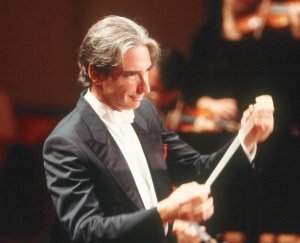
As we're playing the music, the most important thing going on between us is happening in our eyes. We look at each other, and something completely mystical is exchanged between us: sometimes cautioning, sometimes encouraging, looking around to the edges, and even those who are geographically far on the edges being brought towards the center so that we feel their energy above all animating the onward thrust of the music.
He conducts the orchestra as if he's playing an instrument. It's all body language. He does it with facial expression, gestures, with tension in the body, with his stance.
In the performance of everything, in some sense I'm a motivator in the sense that I'm saying "Ready, set, go!" But in other ways I'm a shaper and modulator of what happens. A little extra flick here, a little cautionary sign there, a little encouragement there. What exactly is necessary.
Making the music itself come alive is a kind of sacred thing for me. We look at these little dots and dashes on the paper, we begin to play them, the spirit comes off the page and envelopes us and somehow draws us together as one spirit.
--Michael Tilson Thomas
I played second violin in my high school orchestra, under Sidney Rothstein. What I find intriguing is that what is described here also applies to the nature of the communication between mother and infant. So much is communicated through gesture, eye contact, and body language.
In a paper titled "Superego Development and Psychopathology," the authors write: "The infant has direct experience of the parent's affect as he is held in the mother's arms. Parental displeasure and anger are first experienced tactually and kinesthetically, but this soon becomes linked to a recognition of the parent's affective expression and the parent's angry look. Subsequently, when he is no longer being held, the child remains acutely sensitive to the parent's displeasure, which he can read in the mother's eyes. The sense of shame originates in this fear of evoking displeasure, and is characterized by a wish to avert one's eyes, hide one's face, and not be seen."

No comments:
Post a Comment